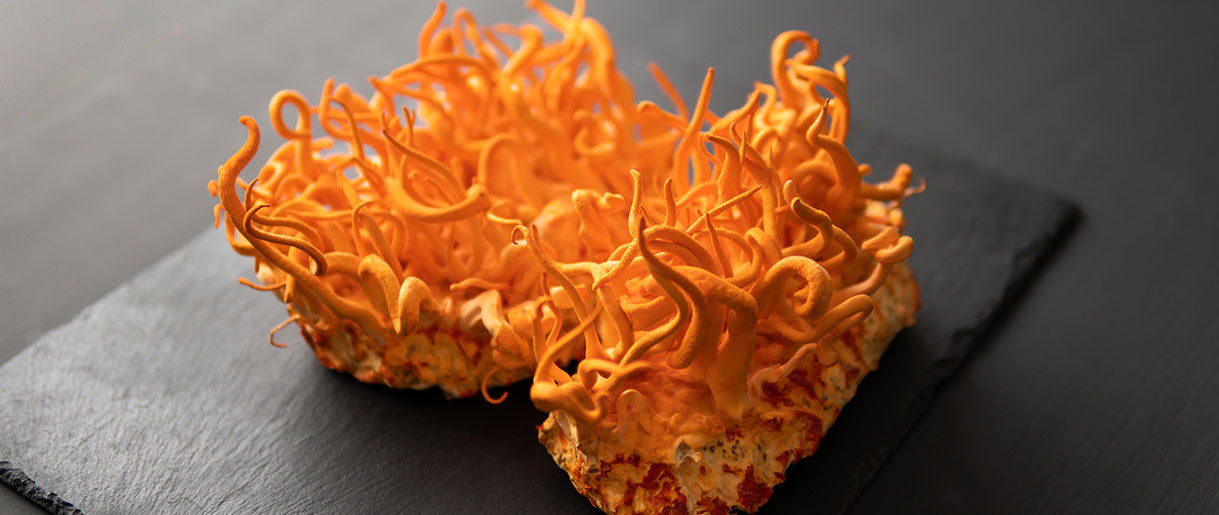Cordyceps and Lions Mane are two renowned functional mushrooms offering unique benefits. Cordyceps is best known for its energy-boosting and athletic performance-enhancing properties due to its ability to increase the body's production of ATP. It is also valued for its immune-boosting properties.
On the other hand, Lions Mane is famous for its positive effects on brain health, improving cognitive function, and stimulating nerve growth factor production, which aids in nerve repair and protection. It also supports gastrointestinal health.
Both mushrooms have few side effects when taken in proper dosages, but those with specific allergies or conditions should consult a healthcare provider. Choosing between the two depends on individual health goals: Cordyceps for a physical performance boost and Lion's Mane for cognitive enhancement and neurological health.
This article will comprehensively compare Cordyceps and Lions Mane, exploring their origins, the scientific research supporting their health benefits, and the best ways to incorporate them into your wellness routine. We understand that choosing what's best for you can be challenging with the vast array of health supplements available today. Through this exploration, we aim to provide the information you need to make an informed decision.
A Closer Look at Cordyceps: Unraveling the Mysteries of a Powerful Medicinal Mushroom

From Caterpillar Fungus to Medicinal Marvel: The History and Origin of Cordyceps
Cordyceps, also known as "Caterpillar fungus," traces its roots back to traditional Chinese medicine. Specifically, Cordyceps Sinensis has been used for centuries due to its potent health benefits.
In nature, this fascinating organism begins its life as a parasitic fungus on caterpillars before eventually taking over and sprouting as a mushroom. Today, most Cordyceps used for supplements are lab-grown, making it a sustainable and vegan-friendly option.
Exploring the Health Benefits of Cordyceps
1. Fueling Energy and Athletic Performance
One of the primary health benefits of Cordyceps mushrooms is their ability to boost energy and enhance physical performance. Research suggests that(1) these powerful medicinal mushrooms improve athletic performance by increasing the body's production of ATP, which is vital for delivering energy to the muscles.
This makes Cordyceps an ideal pre-workout energy boost, helping reduce fatigue and enhance physical activity. For this reason, many people use cordyceps pre-workout to enjoy better results from their workouts.
2. Bolstering the Immune System
Cordyceps mushrooms are also known to support the immune system. They are rich in beneficial compounds that boost the body's immune system, providing an effective shield against various ailments.
3. Other Health Benefits: Anti-aging and Cardiovascular Support
The bioactive compounds found in Cordyceps Sinensis can aid in anti-inflammatory processes, making this medicinal mushroom potentially beneficial for managing cardiovascular diseases. By helping to modulate the immune response and offering anti-inflammatory benefits, Cordyceps can contribute to heart health.
Additionally, there is some evidence that Cordyceps increase testosterone levels, although more research is needed to fully understand the effects of Cordyceps on testosterone and other hormones.
Cordyceps also offer potential anti-aging benefits, largely thanks to their anti-inflammatory properties. Moreover, these mushrooms may contribute to longevity and vitality by aiding fat metabolism and combating harmful inflammation.
Navigating Side Effects and Precautions with Cordyceps
While Cordyceps mushrooms offer numerous health benefits, it's essential to be aware of potential side effects and precautions. Some people may experience mild digestive discomfort when introducing Cordyceps into their diet. It is also suggested to consult with a healthcare provider before beginning any new supplement regimen, particularly for those with autoimmune diseases due to the mushrooms' potent effects on the immune system.
Unveiling the Power of Lion's Mane: A Deep Dive into This Marvelous Medicinal Mushroom

The History and Origin of Lion's Mane: From Edible Mushroom to Medicinal Powerhouse
Lion's Mane mushroom, a key ingredient in traditional medicine, has been revered for centuries for its potential health benefits. Known for its unique, shaggy appearance resembling a Lion's Mane, this edible mushroom has moved from the plate to the supplement aisle thanks to its potent medicinal properties.
Revealing the Health Benefits of Lion's Mane
1. Elevating Cognitive Function and Mental Health
Perhaps the most well-known benefit of Lion's Mane mushrooms is their ability to improve cognitive function. Lion's Mane has been found(2) to stimulate the production of nerve growth factor, a protein that promotes nerve cells' growth and normal function.
This process, in turn, can enhance cognitive functions, foster mental clarity, and potentially improve neurodegenerative disease symptoms. Furthermore, some studies suggest(3) that Lion's Mane increase dopamine levels, thereby supporting mental health and potentially helping to reduce anxiety. Lion's Mane also fights depression, calming and relieving excessive stress.
2. Nourishing the Nerves: The Power of Nerve Growth Factor
The nerve growth factor-inducing property of Lion's Mane is one of its standout features. Beta-glucans, a bioactive compound found in this mushroom, are thought to be responsible for stimulating nerve growth factor production. This effect is crucial for maintaining healthy neurological function, reinforcing the cognitive benefits of Lion's Mane mushrooms.
3. Exploring Other Health Benefits: From Gastrointestinal Health to Heart Health and More
Beyond brain health, Lion's Mane medicinal mushroom provides several other health benefits. It's known to support immune function thanks to its antioxidant and anti-inflammatory properties, which help to bolster the immune system. Lion's Mane is also recognized for its potential benefits in maintaining healthy blood sugar levels, which can be crucial in preventing heart disease.
Furthermore, some research indicates(4) that Lion's Mane might have cancer benefits, though more research is needed in this area. This mushroom's anti-aging properties are linked to its wealth of natural substances, including antioxidants that combat oxidative stress, a key contributor to aging and disease.
Side Effects and Precautions with Lion's Mane
While Lion's Mane mushrooms are generally considered safe and beneficial, they are not devoid of potential side effects. Some people may experience mild stomach discomfort when first taking Lion's Mane.
Also, due to its effects on the immune system and blood sugar levels, those with diabetes or immune disorders should consult a healthcare provider before adding Lion's Mane to their regimen. Consulting a doctor can reduce the risk of unwanted Lion's mane drug interactions that could cause side effects.
Lion's Mane vs. Cordyceps: A Head-to-Head Comparison of Medicinal Mushrooms

Comparing the unique traits and potential benefits of Lion's Mane and Cordyceps mushrooms can help you understand how these unusual fungi can support your health. Lion's Mane and Cordyceps bring many health benefits, but each has a unique profile that makes it stand out.
Health Benefits Showdown: Lion's Mane vs. Cordyceps
Regarding cognitive functions, Lion's Mane mushrooms take the spotlight. They stimulate nerve growth factor production, promoting neuron health and potentially improving memory and concentration. This contrasts with Cordyceps mushrooms, more renowned for their effects on physical endurance and oxygen uptake, enhancing athletic performance and overall vitality.
Interestingly, both Lion's Mane and Cordyceps display potential anti-aging properties. Lion's Mane achieves this through its potent antioxidant properties, while Cordyceps may indirectly contribute by improving cardiovascular health and potentially increasing testosterone levels.
Cancer cells research has also pointed towards potential benefits for both mushrooms. Some studies indicate that beta-glucans in Lion's Mane mushrooms can stimulate the activity of white blood cells, which is crucial in the defense against cancer. Similarly, some research has found(5) that Cordyceps can fight cancer, inhibiting the growth of certain types of cancer cells.
Lion's Mane and Cordyceps also show the potential to maintain lower blood sugar levels. These mushrooms also offer anti-inflammatory benefits, supporting overall wellness.
A Study in Contrasts: Unique Traits of Lion's Mane and Cordyceps
While the health benefits of Lion's Mane and Cordyceps overlap in certain areas, they also have unique attributes. Lion's Mane grows on hardwood trees and is known for its distinctive cascading spines, while Cordyceps is a parasitic fungus that originates from caterpillar larvae in the wild.
On a physiological level, Lion's Mane's ability to fight brain fog and its potential effects on mental clarity and nerve health provide a compelling case for those looking to boost cognitive function. Cordyceps, however, stands out for its capacity to enhance energy and athletic performance.
Side-by-Side Comparison of Side Effects and Precautions
Both Lion's Mane and Cordyceps are generally safe with few side effects. However, some people may experience mild digestive discomfort when starting either supplement. As they can both influence immune function and blood sugar levels, individuals with immune disorders or diabetes should consult a healthcare provider before beginning a regimen with Lion's Mane or Cordyceps.
How to Incorporate Cordyceps and Lion's Mane into Your Daily Routine: Your Guide to Maximizing Benefits

Incorporating Cordyceps and Lion's Mane mushrooms into your everyday regimen can enhance overall wellness. With its health benefits, these medicinal mushrooms offer a natural avenue for supporting everything from cognitive function to cardiovascular health. Here's how you can weave the power of Lion's Mane and Cordyceps into your daily routine.
Choosing Your Mushroom: Available Forms and How to Consume
Lion's Mane and Cordyceps can be consumed in various forms, depending on your preference. They are commonly available in supplement form, typically as capsules, tablets, or powder. Mushroom extracts, such as Lion's Mane extract, are concentrated forms that allow for easy addition to food and drinks.
One popular option is mushroom coffee, which often includes Cordyceps, Lion's Mane, and coffee beans. This is an excellent choice for those seeking a morning boost with added health benefits. Stacking mushrooms, or taking multiple types together, can also enhance the overall benefits.
Timing and Ways to Consume: Lion's Mane vs. Cordyceps
The best time to consume Lion's Mane or Cordyceps depends on the particular benefits you're seeking. If you're taking Lion's Mane for its cognitive benefits, consider having it in the morning or early afternoon. You can then benefit from improved focus and mental clarity throughout your workday.
On the other hand, if you plan to consume Cordyceps everyday for its energy-boosting effects, taking it before a workout or first thing in the morning can help maximize its potential. Because of its energizing effects, the best time to take Cordyceps is usually in the morning since taking it at night can interfere with sleep.
Quick and Easy Recipes Incorporating Lion's Mane and Cordyceps
Adding Lion's Mane and Cordyceps to your meals can be as easy as sprinkling powder into your favorite recipes. Here are a couple of ideas to get you started:
Mushroom Coffee with Lion's Mane and Cordyceps
Start your day with a refreshing cup of mushroom coffee. Add a scoop of Lion's Mane and Cordyceps powder or extract to your regular coffee for a morning pick-me-up with added health benefits.
Lion's Mane Omelette
Give your breakfast a cognitive boost by adding chopped Lion's Mane mushroom to your morning omelet. The mushroom's subtle flavor pairs well with eggs, and you'll kickstart your day with some brain-enhancing benefits.
Cordyceps Energy Smoothie
Combine a teaspoon of Cordyceps mushroom powder with your favorite fruits, a handful of spinach, and almond milk for a revitalizing smoothie. This can provide an excellent pre-workout energy boost.
FAQs About Lion's Mane vs. Cordyceps
Can Cordyceps And Lion's Mane Be Taken Together?
Yes, Cordyceps and Lion's Mane can be taken together. This is known as "stacking" in the world of medicinal mushrooms. These mushrooms can enhance each other's benefits when used in conjunction. For instance, Cordyceps' energy-boosting and physical performance-enhancing effects can complement Lion's Mane's cognitive-boosting properties, leading to mental and physical enhancement.
However, start with small doses to see how your body reacts to each mushroom extract. Also, remember that everybody is different, and what works for one person might not work for another. Therefore, consult a healthcare professional before combining the cordyceps mushroom extract with Lion's Mane.
Are There Any Specific Groups Of People Who Should Avoid Using Cordyceps Or Lion's Mane?
While Cordyceps and Lion's Mane are generally considered safe for most people, certain populations should exercise caution or avoid them altogether—these include:
- Individuals with Autoimmune Disorders: Cordyceps and Lion's Mane have immune-modulating effects. While this can benefit many individuals, those with autoimmune disorders like lupus, multiple sclerosis, or rheumatoid arthritis might experience worsening symptoms, as these mushrooms could potentially stimulate an already overactive immune system.
- People with Allergies or Sensitivities: As with any new food or supplement, individuals may have unknown allergies or sensitivities to these mushrooms. If you experience allergic reactions (like itching, swelling, dizziness, or trouble breathing) after taking Lion's Mane or Cordyceps, discontinue use and seek medical attention.
- People with Bleeding Disorders or on Anticoagulant Therapy: Although more research is needed, some evidence suggests that Lion's Mane may affect blood clotting. Individuals with bleeding disorders or those on anticoagulant/antiplatelet drugs should exercise caution.
- Pregnant or Nursing Women: While no specific dangers have been identified for pregnant or breastfeeding women, these populations lack safety data. Therefore, it is generally recommended that they avoid use unless under the guidance of a healthcare provider.
- Those Scheduled for Surgery: Stopping Lion's Mane at least two weeks before scheduled surgery is recommended due to the potential effects on blood clotting. The same caution is suggested for Cordyceps because of its potential impact on blood sugar levels and immune function.
- Individuals with Diabetes: Both Cordyceps and Lion's Mane can potentially lower blood sugar levels. While this could be beneficial for many, those with diabetes or hypoglycemia should monitor their blood sugar closely and consult with a healthcare provider before beginning these supplements.
Again, it's essential to consult with a healthcare provider or a professional knowledgeable in herbal medicine before starting any new supplement regimen. Always ensure that these supplements are appropriate for your health circumstances.
What Is The Recommended Dosage For Cordyceps And Lion's Mane Supplements?
As with many dietary supplements, the recommended dosage for Cordyceps and Lion's Mane can vary based on several factors, including your specific product, overall health, age, and body weight.
For Cordyceps,many supplement manufacturers recommend a dosage of around 1,000 to 3,000 mg daily, but studies have used amounts ranging from 1,000 to 6,000 mg daily. Cordyceps is often taken in multiple doses (split into two or three) throughout the day.
For Lion's Mane, the commonly suggested dosage ranges from 500 mg to 3,000 mg daily, depending on the concentration of the extract. This Lion's Mane dosage is often taken once per day.
Key Takeaways
Throughout exploring Cordyceps and Lion's Mane, we've unearthed a wealth of knowledge surrounding these two formidable medicinal mushrooms. These fungi bring unique benefits, making them worthy additions to any health-conscious individual's routine.
Traditionally prized in Chinese medicine, Cordyceps offers exceptional energy-boosting properties, aiding in improved athletic performance and promoting a robust immune system. On the other hand, Lion's Mane shines as a nootropic, enhancing cognitive function and mental health while also playing a role in nerve repair.
Their unique traits make them distinctively valuable, yet their shared attributes, such as immune support, anti-inflammatory properties, and a rich content of beneficial compounds, further amplify their appeal.
We invite you to share your experiences with Cordyceps and Lion's Mane. Have you tried them before? If so, what differences did you notice? What are your hopes and expectations if you're new to medicinal mushrooms? Your stories and questions help us deliver relevant content and foster a community of health-conscious individuals navigating the world of holistic wellness together.
References
- Pharmacological and therapeutic potential of Cordyceps with special reference to Cordycepin, (1)https://www.ncbi.nlm.nih.gov/pmc/articles/PMC3909570/
- Neurotrophic properties of the Lion's mane medicinal mushroom, Hericium erinaceus (Higher Basidiomycetes) from Malaysia, (2)https://pubmed.ncbi.nlm.nih.gov/24266378/
- Therapeutic Potential of Hericium erinaceus for Depressive Disorder, (3)https://www.ncbi.nlm.nih.gov/pmc/articles/PMC6982118/
- Hericium erinaceus (Lion's Mane) mushroom extracts inhibit metastasis of cancer cells to the lung in CT-26 colon cancer-tansplanted mice, (4)https://pubmed.ncbi.nlm.nih.gov/23668749/
- The Anticancer Properties of Cordycepin and Their Underlying Mechanisms, (5)https://www.ncbi.nlm.nih.gov/pmc/articles/PMC6212910/









Let Us Know Your Comments